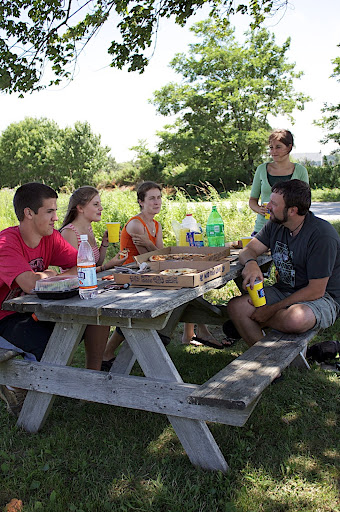This is the end of my first week as an intern on Ryder Farm Organic in Brewster, NY. I'll be here until October 1. Then I'll head back up to Maine for the month to experience rehearsals, do any odd jobs the OFAF team asks of me, and hopefully carve a pumpkin or two! (Halloween in Germany just isn't the same.)
And...where to begin?
Living on a farm has turned my brain into a veritable hothouse of thoughts and ideas about farming. Observations we'd made last summer that had slipped my mind until now resurface like perennials: for example, how each farmer and farm worker develops his or her own "work costume" - like Tali and his hoodies, Penny and her boots, the Ryder interns and their daily long-sleeved plaid-patterned dirty button-downs. New experiences spark new thoughts and connections: I worked my first-ever farmer's market yesterday, in Union Square, and interacting with customers, setting up displays (and seeing what sells and what doesn't!), answering questions, inventorying - it all really drives home why it's important to plant, harvest and prep the way that we do. On a farm that manages to stay afloat, there may be madness, but there is a whole lot of method to it.
ABOVE: What the Ryder Farm stand at Union Square Greenmarket looks like
There are many things I could post about. An endless number of things. But another important thing I've (re)learned through the process of writing, sharing, and revising our play is this big thing that a successful small farm and a good play have in common: They are about people. Just as audiences are far more likely to invest and engage in a piece of theater if they care and understand and connect to its characters, customers are far more likely to support a small farm if they know and trust and care about the people who work on it.
So I wanted to write about a person on Ryder: Fuad, the field manager.
In some ways, Fuad reminds me of Jordan Farm's PeeWee. Fuad hails originally from another country (Bangladesh). He has worked on Ryder Farm for 15 years. Like PeeWee, he has developed over his time here an important relationship with a strong woman whose family owns the farm (Betsey Ryder), a relationship based on trust and communication. On a farm where most of the workers change from season to season, Fuad provides a strong and capable through-line, training and managing each year's new team.
Of course, Fuad is also not like PeeWee at all. I think the point of divergence starts with that crucial question to which we're always returning: What is a farmer? We've asked PeeWee before if he considers himself a farmer, and he's said "No." Though Fuad does not own Ryder Farm, though he is an employee, there is no question that he considers himself a farmer. He was trained in organic farming at UCA Santa Cruz, has worked on many different farms in many different states of this country, and lives, breathes and dreams farming.
Farmers are chock-full of knowledge and information about what they do - but it can be pretty rare to find a natural sharer who'll try to let you in on some of that information without being asked first. Fuad, however, is just that. He's a born teacher. He will never stop at telling you how to do something; he always tells you why to do it that way, too. A day working with/for Fuad is a day packed with knowledge nuggets and impromptu mini-lectures on sowing, harvesting, prep, food, plants, pests, tools, climate, sustainability and just about anything else you can imagine. There's a guest blog of his on Katonah Green about growing garlic from the 2009 season where you can get a taste of how much he loves to share his craft.
On Thursday, as we were sowing tiny sand-thinned radish seeds by hand in the hot midday sun, Fuad was inspired, waxing poetic in an unstoppable monologuic stream. "Plants are not active. They are passive. If there is not much of water in the soil, the plant will grow deeper roots to find the water. If the plant is growing in the shade, it will develop broader leaves to try to catch the sunlight. That is passive, that is not active. A plant cannot act. That is why I say it depends on environment. This is all environment. Water, light, sunshine. I do not believe people have green thumbs.
"Plants have a rhythm," he added. "You feel it when you touch the plant. In order to work with the plant you have to feel the rhythm."
Fuad is quite a character and it doesn't take long to pick up on his quirks. Like his own personal turns of phrase: "much of" (as in "There is too much of bugs") and "pick up" (as in "How much of basil did you pick up?"), and beginning sentences with "So what I have in mind is...". And his habit of always having a coffee mug in his hand until lunch - you'll often find rogue coffee mugs scattered forlorn and forgotten about the fields - and taking a nap during the midday break. He is curious about everything - he's already asked me scores of questions about the plot and characters in our play - and clearly beloved by the long-term members of the Ryder Farm CSA, who often show up to visit, bringing him hugs and chicken dinners.
"I know how to cook everything I grow. I eat everything I grow," Fuad said a few days ago. I think that's the heart of what makes him a successful and passionate grower.





